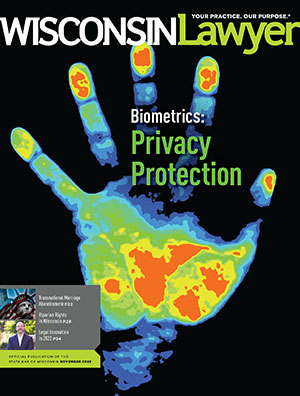Five-year Statute of Limitation Applies to BIPA Claims

I warned of the emerging risk to Wisconsin companies posed by the Illinois Biometric Information Privacy Act (BIPA) in my article, “Biometrics Outside Borders: Privacy Protection Acts and Wisconsin Lawyers,” published in the November 2022 edition of Wisconsin Lawyer.
The Illinois Supreme Court recently addressed the statute of limitation applicable to BIPA claims, in Tims v. Black Horse Carriers Inc., 2023 IL 127801, __ N.E.3d __. The court was asked to decide between a one-year statute applicable to “[a]ctions for slander, libel or for publication of matter violating the right of privacy,” 735 ILCS 5/13-201, and a five-year catchall limitation for claims with no other specified limitation period, 735 ILCS 5/13-205.
In a straightforward analysis, the court held that the five-year statute applies because “Illinois courts have routinely applied this five-year catchall limitations period to other statutes lacking a specific limitations period.” Tims, 2023 IL 127801, ¶ 34. The court also concluded that “it would thwart legislative intent” to “shorten the amount of time an aggrieved party would have to seek redress for a private entity’s noncompliance with the Act.” Id. ¶ 39. The court reached the correct result, in that the five-year statute is the better fit of the two. But there was another option.
Before being reversed, the Appellate Court of Illinois found that some BIPA claims are governed by the one-year statute, while others are governed by the five-year statute. SeeTims v. Black Horse Carriers Inc., 2021 IL App (1st) 200563, ¶¶ 31-33, 184 N.E.3d 466, aff’d in part, rev’d in part, 2023 IL 127801.
The appellate court’s reasoning was sound. It noted that certain BIPA violations – such as failure to obtain informed consent – do not require the plaintiff to prove that the defendant “published or disclosed any biometric data to any” third party. Id. ¶ 31. In those instances, the five-year statute applies because the plaintiff is not complaining of the “publication of matter violating the right of privacy.” Id. (quoting 735 ILCS 5/13-201). Conversely, if the BIPA claim asserts unlawful disclosures or dissemination of data (such as a breach or sale of data), then “publication or disclosure of biometric data is clearly an element” of the claim and the one-year statute of limitation applies. Id. ¶ 32.
The Illinois Supreme Court rejected this approach, finding that “[t]wo limitations periods could confuse future litigants” and that it would “create an unclear, inconvenient, inconsistent, and potentially unworkable regime.” Tims, 2023 IL 127801, ¶¶ 20-21. True though this may be, the statutes are unambiguous, and the appellate court more faithfully applied the plain language.
Either way, Tims stands as the latest in a long line of Illinois cases clearing the way for would-be BIPA plaintiffs. And the risk to Wisconsin companies – discussed in my original article – just became slightly more pronounced, as would-be plaintiffs can now look back five years to bring claims for violations of the Illinois Biometric Information Privacy Act.
David P. Hollander
Stafford Rosenbaum LLP, Madison
Women Don’t Get Pregnant by Themselves
Pro-life or pro-choice is not the issue. Equal protection is. Wisconsin’s 1849 abortion statute is an unenforceable infringement upon a woman’s inherent right to engage in sexual intercourse, as guaranteed by our Wisconsin Constitution, and denies her equal protection of the law.
Originating in the inherent right to engage in sexual intercourse, unenumerated, constitutionally protected rights include the rights to marry; to procreate; of access to contraception; of parental self-determination in the religious education of children; to parental child control, care, and custody; and to child rearing and education.
In my view, a right of parents to direct the upbringing of their children is among the “unalienable Rights” with which the Declaration of Independence proclaims “all men … are endowed by their Creator.” And in my view that right is also among the “othe[r] [rights] retained by the people,” which the Ninth Amendment says the Constitution’s enumeration of rights “shall not be construed to deny or disparage.” Troxel v. Granville, 530 U.S. 57, 91-92 (2000) (Scalia, J., dissenting).
Our Wisconsin Constitution protects, not creates, the “unalienable Rights” of human sexuality and sexual intercourse, with which all people “are endowed by their Creator.” “Equality; inherent rights. SECTION 1. All people are born equally free and independent, and have certain inherent rights; among these are life, liberty and the pursuit of happiness; to secure these rights, governments are instituted, deriving their just powers from the consent of the governed.”
Conception, the union of the female gamete and the male gamete and the formation of a one-celled zygote, triggers the abortion statute. Under the specious argument that only women become pregnant, the statute discriminates against a woman who engages in sexual intercourse resulting in conception. While it has no impact upon the equally responsible male, the statute requires the woman to “suffer disproportionately the profound physical, emotional, and psychological consequences of sexual activity.” Michael M. v. Superior Ct., 450 U.S. 464 (1981).
The statute’s discrimination imposes a risk of death. In 2022, the University of Colorado Boulder authors of a report on “the maternal mortality consequences of the loss of abortion access” estimate that, per 100,000 pregnancies, one Wisconsin woman will die due to the loss of abortion access. Our Wisconsin Maternal Mortality Review Team considers the loss of abortion access in the chain of events initiated by pregnancy resulting in a maternal pregnancy-related death. In 2024, MMRT will review the causes of pregnancy-related deaths occurring in 2022.
Wis. Stat. section 940.04 is presumptively invalid and lacks a compelling governmental interest for discriminating against a woman. For exercising her inherent right resulting in conception, the statute inflicts substantial adverse repercussions upon her physical and mental well-being, economic well-being, and legal status. For the same exercise and consequence, the statute favorably treats the equally responsible male by omission. This statute is neither narrowly tailored nor least restrictive. Wis. Stat. section 940.04 is unenforceable as a matter of law and must be stricken before it is too late.
Atty. John Zarbano
Oshkosh
We Want to Hear from You! Submit a Letter to the Editor
Wisconsin Lawyer provides a forum for members to express ideas, concerns, and opinions on law-related subjects. Send comments to wislawyer@wisbar.org (include “Letters” in the subject line), or mail to Wisconsin Lawyer “Letters,” P.O. Box 7158, Madison, WI 53707-7158. Limit to 500 words. Writing guidelines available.
Connect With Us Online. Post comments to articles
online, and find us on Facebook, Twitter, LinkedIn, Instagram, and YouTube.
Videoconferencing Saves Time, Money for All Participants

In her column, “Videoconferencing Promotes Justice for All” (Wisconsin Lawyer, Nov. 2022), State Bar President Margaret Hickey said allowing lawyers and clients to attend some hearings by videoconference saves time and money, reduces nonappearances, and makes the legal system more accessible.
A reader posted a response:
Reader: I enjoyed President Hickey’s message relating to videoconferencing. I wholeheartedly agree with her comments. I practice primarily probate law in the Milwaukee area, and I have a very active practice. I have not had to go to the courthouse in the last two years because of the ability to handle all probate related hearings by videoconferencing. The probate personnel at the Milwaukee courthouse do an outstanding job being on time and arranging for videoconferencing. Hearings that took 1.5 to 2 hours at the courthouse, which included travel, are now mostly 10 minutes long. I do not have to charge for travel expenses or travel time. My only complaint is I don’t get to visit downtown businesses after the hearing, which I sometimes did after hearings at the courthouse. But this is Usinger’s problem and not mine.
Jim Winiarski
James Winiarski Law Office, Milwaukee
Justice System in Crisis

In “Breaking Point: Vacant Prosecutor Positions Fuel Justice System Crisis” (InsideTrack, Jan. 18, 2023), Joe Forward wrote about how the lack of adequate funding for the justice system, including for adequate salaries for prosecutors and public defenders, depresses the ability to hire, train, and retain qualified lawyers for open positions, and how that lack of professional personnel ultimately affects litigants, victims, and witnesses throughout the civil and criminal justice systems.
Several readers posted comments:
Reader: I went to U.W. Law School seeking to become a local prosecutor. What I found out in law school was this same problem: the system is poorly funded and no plans have been made to ensure the public has adequate access to justice in the Wisconsin legal system. I have since left the state to pursue other litigation opportunities.
Believe me, I want nothing more than to return to Wisconsin with an opportunity to work as a prosecutor and help fix a broken system. However, I will not do such a thing, nor would most people, who can find similar opportunities outside Wisconsin that compensate far better. The simple solution is to provide fair pay to prosecutors and public defenders in meeting the need for access to justice by the public.
Kasey Erb
McGuireWoods LLP, Washington, DC
Reader: As a private bar attorney, administrative tasks such as billing are taking a back seat to getting the work done. Unfortunately, that means my billing is at least six months behind (coincidentally I just had a judge write off my court-appointed bill because it wasn’t submitted within 30 days of case closure). I have also been forced to take on a lot of “investigative” work because I can’t find anyone to work as an investigator for $25 per hour, so I’ve taken to begging friends and family members to “witness” my interviews. None of this leaves time to sufficiently complete the work of lawyering.
Increasing the travel rate is not going to solve the systemic issue either. Rural areas are increasingly open to using videoconferencing for hearings, which is great because it is tough to justify a 30 minutes-plus one-way trip for a four-minute hearing, but many courts are still resistant to the technology making the travel deadtime a necessary evil.
I will say, in counties where the jail staff are willing to work with us to get papers signed and facilitate repeated time-sensitive phone calls (especially during negotiations), it has been a lot easier to serve some of these remote areas.
Thanks for taking time to look into the needs of the system. I hope we can find some creative solutions.
Michelle Erdman
Erdman Law Office SC, Baldwin
Reader: It escapes me as to why judges have not been saying anything about these problems. Surely, they see them better than anyone.
I also note that Wisconsin private-bar appellate attorneys are as usual a forgotten group. It looks like about 80% of the Court of Appeals cases and decisions are in criminal cases. Working for $70 per hour on Wisconsin appeals is pretty much asking to lose money or make a small profit. Even $125 per hour is slim pickings. As I recall, when legislators need lawyers relating to their official duties, they hire lawyers at $350 to $750 per hour, and the taxpayers pay.
Criminal justice on the cheap does not work.
Nicholas Zales
Zales Law Office, Milwaukee
» Cite this article: 96 Wis. Law. 6-8 (March 2023).
